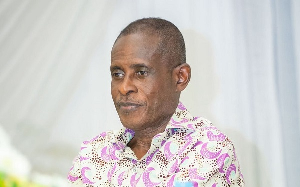Tarkwa (W/R), Aug. 18, GNA - President John Agyekum Kufuor on Thursday pledged the Government's commitment of 25 billion cedis to the University of Mines and Technology (UMaT) at Tarkwa in the Western Region.
He said the Minerals Development Fund of Ministry of Finance and Economic Planning (MFEP) was also contributing 83 billion cedis to the UMaT as seed money to help to solve the University's teething problems. President Kufuor said as a new University, "you need well-trained lecturers; hostels; lecture theatres; well-equipped laboratories; vehicles, roads and other infrastructure.
He made the pledge when he presented the charter accreditation certificates and unveiled a UMaT Monument to officially inaugurate the sixth State University in the country.
UMaT began in 1952 as Tarkwa Technical Institute. In 1961, the school was re-organised to become the Tarkwa School of Mines to train the required manpower for the mining allied industries in Ghana.
The school was affiliated to the Kwame Nkrumah University of Science and Technology (KNUST) as a Faculty of the University. In October 2001, it became the Western University College of KUNST and then in November 2004, it was established as a full-fledged University.
President Kufuor said, Science and Technology provided the platform upon which Ghana's developmental ambitions could be achieved and the inauguration of the University to offer training in science and technology should make Ghanaians happy and hopeful.
He said not only would it provide increased access to tertiary education, it would also produce a consistent supply of well-trained human resource that would work in the mining sector which was one of the major contributors of revenue to Ghana's economy, he said. President Kufuor appealed to the University to diligently honour its charter and core business of providing training in mining and related disciplines for the people of Ghana.
He said it was obvious that tertiary institutions in the country tended to have a strong bias towards the humanities but it was time to refocus priorities towards science and technology, adding; "though the national policy for years has been to have a ratio of 60 per cent and 40 per cent humanities, this has not been achieved."
President Kufuor said this policy was not a fanciful one, but rather based on the realisation that Ghana's developmental needs required science and technology, adding, "so however tempting the humanities might be, I urge the University of Mines and Technology to stick largely to science and its practical applications".
He said this did not mean that the University should restrict itself to a single purpose and narrow outlook but there must be room to consider other related disciplines such as industrial management, which should be of great help to the mining as well as the industrial sector. "All it means is that the University's persona and forte must clearly and decidedly continue to be scientific and technological, whatever else it might aspire to seem in the academic world", he said. He said the mining companies in the country were going to be great beneficiaries of the University and, therefore, appealed to the mining community to invest in the University and to help it in whatever way they could.
President Kufuor said many of the mining companies were multinational with their parent companies spread the world over and so it should not be difficult for them to keep the University informed of the new technologies and best practices that were being developed in the industry globally, adding; "if the quality of training was abreast with international standards, the quality of the graduate you employ hits the ground running when he or she starts to work with you."
President Kufuor urged the mining and allied companies in the country to provide generous financial support to the new University to enable it to have a well-equipped assaying laboratory to test the quality of gold and other minerals that were produced.
He asked them to strive to keep up with the development in the world around them and nurture a good maintenance culture, which would be more crucial as their number increased saying, "let us not wait for the equipment in the laboratory or workshop to become completely antiquated before its fittings are replaced; let us not wait for until we get billions of cedis for imports before we refurbish every little bit of our machinery. We must be practical and inventive as technologist to save time and cut cost without losing quality", he said. 18 Aug. 05
General News of Thursday, 18 August 2005
Source: GNA
25 billion cedis For UMAT
Opinions











